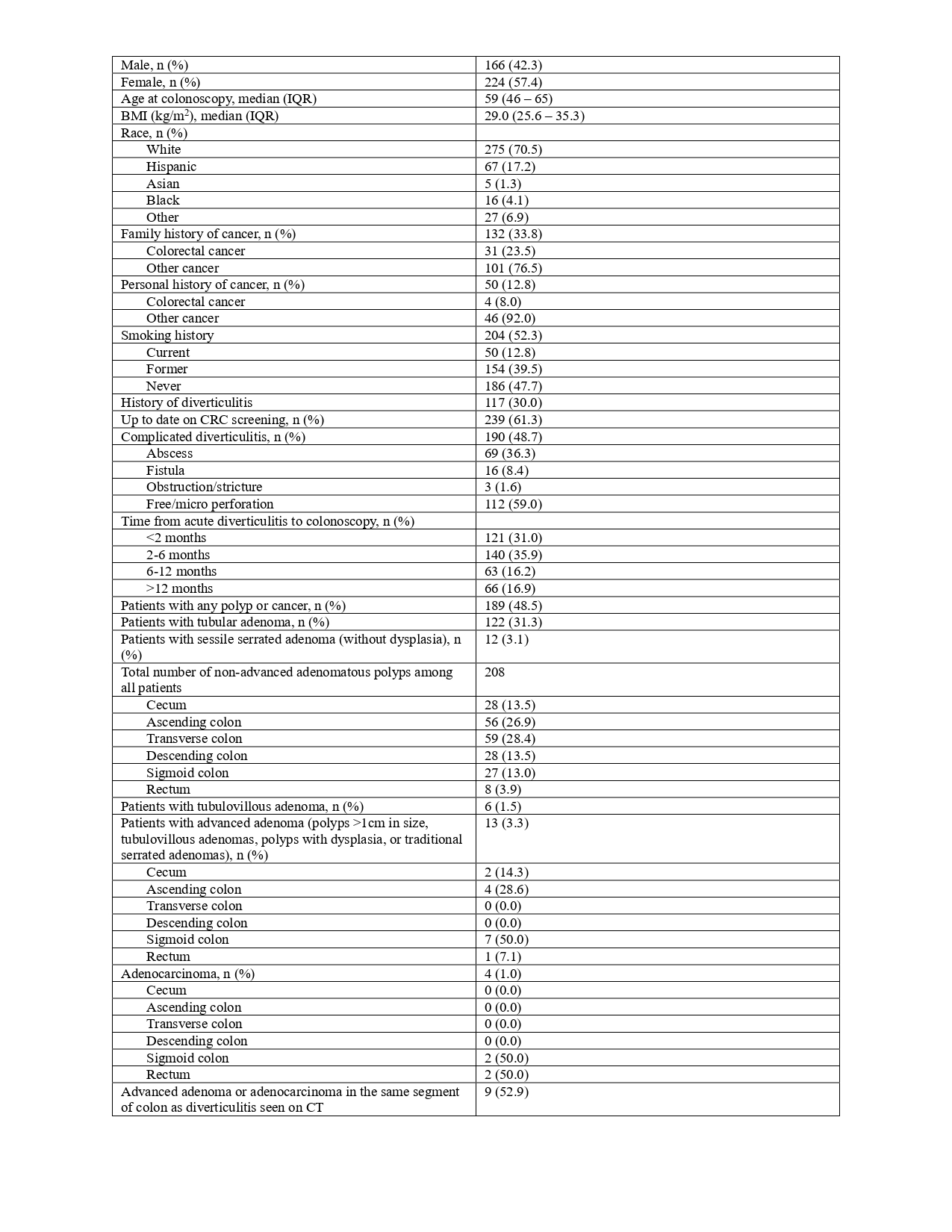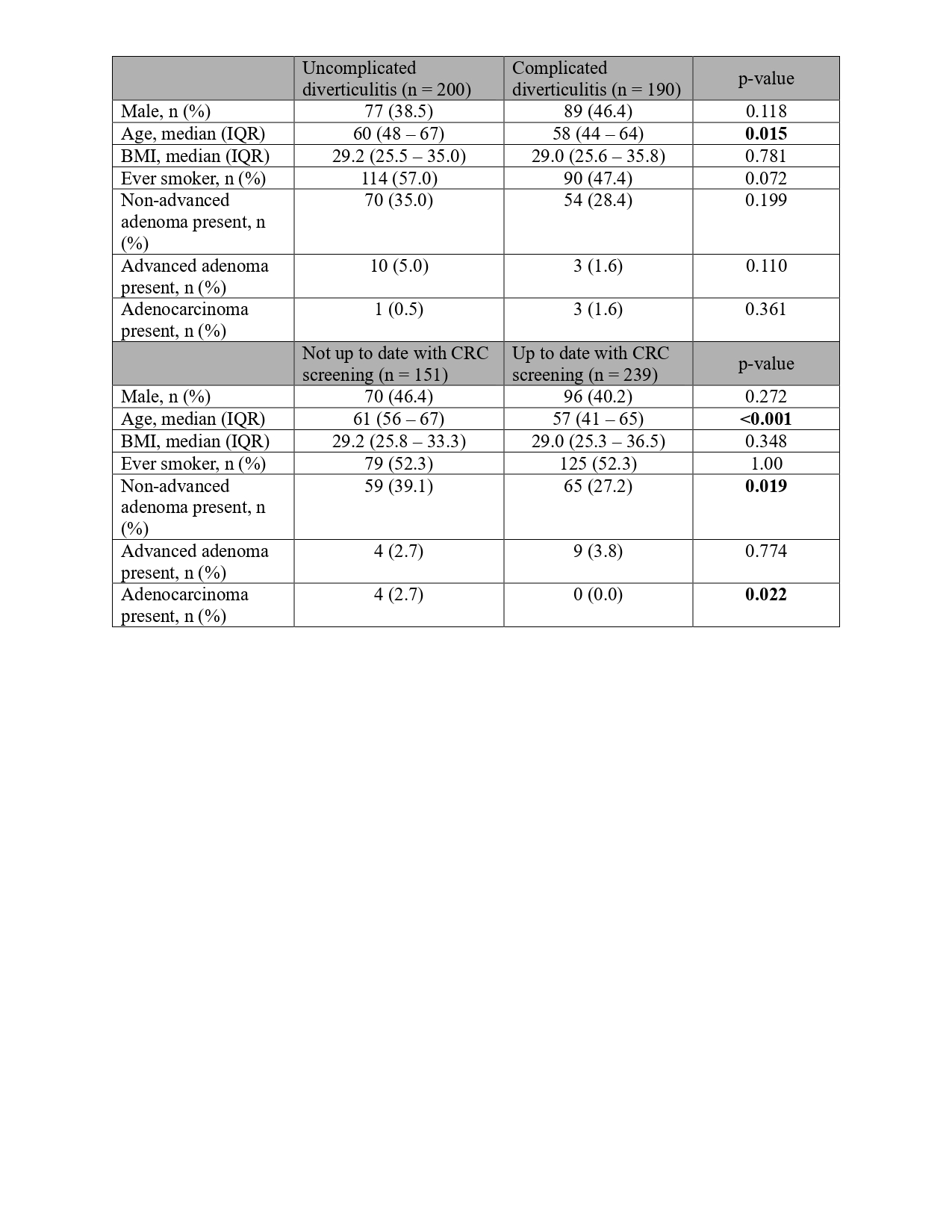Tuesday Poster Session
Category: Colon
P4558 - The Effectiveness of Post-Acute Diverticulitis Colonoscopy in Detecting Advanced Neoplasia: Insights From a Large Retrospective Cohort
Tuesday, October 28, 2025
10:30 AM - 4:00 PM PDT
Location: Exhibit Hall

Samuel Cheong, DO
University of Arizona College of Medicine
Tucson, AZ
Presenting Author(s)
Award: ACG Presidential Poster Award
Samuel Cheong, DO1, John Azizian, MD2, Maxwell Hart, MD1, Franklin Liu, MD1, Sabrina Ho, MD2, Rama Mouhaffel, MD2, Cameron Thompson, MD2
1University of Arizona College of Medicine, Tucson, AZ; 2Banner - University of Arizona Tucson, Tucson, AZ
Introduction: Acute diverticulitis (AD) leads to approximately 208,000 hospitalizations annually in the US. Current guidelines recommend colonoscopy following any complicated AD episode or a first episode of uncomplicated AD, typically within 6–8 weeks, unless a recent high-quality colonoscopy was performed. Despite this, practice patterns vary and many gastroenterologists perform post-AD colonoscopy regardless of individual risk. The true diagnostic yield of this practice remains uncertain. This study assessed the effectiveness of post-AD colonoscopy in detecting adenomatous polyps, advanced adenomas, and colorectal cancer (CRC).
Methods: We conducted a retrospective study of post-AD colonoscopies performed at 2 tertiary care academic centers from May 2015-September 2024. Inclusion required CT-confirmed AD. We collected demographic, radiologic, and colonoscopic data including AD severity (uncomplicated vs. complicated), types of complications, polyp characteristics, and detection of advanced adenomas (≥1 cm, tubule-villous histology, high-grade dysplasia) or CRC. Data were further stratified by patients up to date (UTD) and not up to date (not UTD) with CRC screening.
Results: Of 390 patients, 48.7% had complicated AD. Median age at colonoscopy was 59 years (IQR 45–65); 42.3% were male. Advanced adenomas were detected in 3.3%, and CRC in 1.0%. Most advanced adenomas were found in the ascending and sigmoid colon. Complicated AD patients were significantly younger (p=0.015), while smoking history and advanced adenoma presence lost significance after stratification. Comparing patients UTD vs. not UTD with CRC screening, age remained significantly different (p< 0.001), with not UTD patients being older. BMI lost significance (p=0.348 vs. 0.048). Adenocarcinoma was only identified in patients not UTD with CRC screening (p=0.022).
Discussion: This study shows that complicated AD is associated with younger age, and while smoking history and advanced adenoma presence were initially significant, these lost significance after stratification. Importantly, adenocarcinoma was detected exclusively in patients not UTD with CRC screening, likely confounded by older age. These findings support prioritizing post-AD colonoscopy for patients not UTD with CRC screening and suggest that non-invasive screening strategies (e.g., Cologuard) could be considered for those already UTD, potentially reducing unnecessary procedures and associated costs. Further prospective studies are warranted to validate these observations.

Figure: Table 1. Characteristics and endoscopic findings in patients with CT-confirmed acute diverticulitis. Note, some patients had multiple polyps. (n=390 patients)

Figure: Table 2. Characteristics and endoscopic findings stratified by complicated/uncomplicated diverticulitis confirmed on CT and patients up to date and not up to date (due for) CRC screening.
Disclosures:
Samuel Cheong indicated no relevant financial relationships.
John Azizian indicated no relevant financial relationships.
Maxwell Hart indicated no relevant financial relationships.
Franklin Liu indicated no relevant financial relationships.
Sabrina Ho indicated no relevant financial relationships.
Rama Mouhaffel indicated no relevant financial relationships.
Cameron Thompson indicated no relevant financial relationships.
Samuel Cheong, DO1, John Azizian, MD2, Maxwell Hart, MD1, Franklin Liu, MD1, Sabrina Ho, MD2, Rama Mouhaffel, MD2, Cameron Thompson, MD2. P4558 - The Effectiveness of Post-Acute Diverticulitis Colonoscopy in Detecting Advanced Neoplasia: Insights From a Large Retrospective Cohort, ACG 2025 Annual Scientific Meeting Abstracts. Phoenix, AZ: American College of Gastroenterology.
Samuel Cheong, DO1, John Azizian, MD2, Maxwell Hart, MD1, Franklin Liu, MD1, Sabrina Ho, MD2, Rama Mouhaffel, MD2, Cameron Thompson, MD2
1University of Arizona College of Medicine, Tucson, AZ; 2Banner - University of Arizona Tucson, Tucson, AZ
Introduction: Acute diverticulitis (AD) leads to approximately 208,000 hospitalizations annually in the US. Current guidelines recommend colonoscopy following any complicated AD episode or a first episode of uncomplicated AD, typically within 6–8 weeks, unless a recent high-quality colonoscopy was performed. Despite this, practice patterns vary and many gastroenterologists perform post-AD colonoscopy regardless of individual risk. The true diagnostic yield of this practice remains uncertain. This study assessed the effectiveness of post-AD colonoscopy in detecting adenomatous polyps, advanced adenomas, and colorectal cancer (CRC).
Methods: We conducted a retrospective study of post-AD colonoscopies performed at 2 tertiary care academic centers from May 2015-September 2024. Inclusion required CT-confirmed AD. We collected demographic, radiologic, and colonoscopic data including AD severity (uncomplicated vs. complicated), types of complications, polyp characteristics, and detection of advanced adenomas (≥1 cm, tubule-villous histology, high-grade dysplasia) or CRC. Data were further stratified by patients up to date (UTD) and not up to date (not UTD) with CRC screening.
Results: Of 390 patients, 48.7% had complicated AD. Median age at colonoscopy was 59 years (IQR 45–65); 42.3% were male. Advanced adenomas were detected in 3.3%, and CRC in 1.0%. Most advanced adenomas were found in the ascending and sigmoid colon. Complicated AD patients were significantly younger (p=0.015), while smoking history and advanced adenoma presence lost significance after stratification. Comparing patients UTD vs. not UTD with CRC screening, age remained significantly different (p< 0.001), with not UTD patients being older. BMI lost significance (p=0.348 vs. 0.048). Adenocarcinoma was only identified in patients not UTD with CRC screening (p=0.022).
Discussion: This study shows that complicated AD is associated with younger age, and while smoking history and advanced adenoma presence were initially significant, these lost significance after stratification. Importantly, adenocarcinoma was detected exclusively in patients not UTD with CRC screening, likely confounded by older age. These findings support prioritizing post-AD colonoscopy for patients not UTD with CRC screening and suggest that non-invasive screening strategies (e.g., Cologuard) could be considered for those already UTD, potentially reducing unnecessary procedures and associated costs. Further prospective studies are warranted to validate these observations.

Figure: Table 1. Characteristics and endoscopic findings in patients with CT-confirmed acute diverticulitis. Note, some patients had multiple polyps. (n=390 patients)

Figure: Table 2. Characteristics and endoscopic findings stratified by complicated/uncomplicated diverticulitis confirmed on CT and patients up to date and not up to date (due for) CRC screening.
Disclosures:
Samuel Cheong indicated no relevant financial relationships.
John Azizian indicated no relevant financial relationships.
Maxwell Hart indicated no relevant financial relationships.
Franklin Liu indicated no relevant financial relationships.
Sabrina Ho indicated no relevant financial relationships.
Rama Mouhaffel indicated no relevant financial relationships.
Cameron Thompson indicated no relevant financial relationships.
Samuel Cheong, DO1, John Azizian, MD2, Maxwell Hart, MD1, Franklin Liu, MD1, Sabrina Ho, MD2, Rama Mouhaffel, MD2, Cameron Thompson, MD2. P4558 - The Effectiveness of Post-Acute Diverticulitis Colonoscopy in Detecting Advanced Neoplasia: Insights From a Large Retrospective Cohort, ACG 2025 Annual Scientific Meeting Abstracts. Phoenix, AZ: American College of Gastroenterology.

